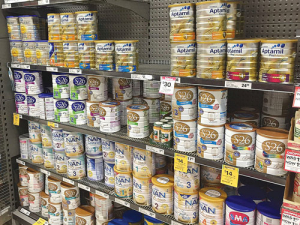Formula goes sour
OPINION: Media reports say global recalls tied to cereulide toxin contamination in milk-based nutrition brands could inflict combined financial losses exceeding $1 billion.
 New Zealand infant formula is being exported out of Australia through unofficial Chinese trade channels, contributing to a shortage in Australia supermarkets.
New Zealand infant formula is being exported out of Australia through unofficial Chinese trade channels, contributing to a shortage in Australia supermarkets.
New Zealand brands are at the centre of infant formula shortages in Australia supermarkets.
They are among popular formulas bought by daigou (‘dye-go’ = overseas shopper buying on behalf) and sent to China via ‘grey channels’.
Australia restricts the export of Australian-made products but not imported products, making NZ products a particular target.
But Infant Nutritrion Council chief executive Jan Carey says Australian news media do not adequately report that parents can still buy the formula they want though the various manufacturers’ ‘carelines’ (websites).
“The first priority for a company is to make sure there is supply for the people who need it and for local families to get first priority,” Carey says.
“The product is made for the Australian market, and whether it is made in NZ, Australia or overseas, it is [intended to meet] the demands of the Australian market.”
Carey says the problem of supermarket shortages pertains to Australia, not NZ.
“There was a problem in NZ a few years ago and the NZ Government regulated the amount of formula people could purchase and export. Immediately that daigou trade moved to Australia.”
A daigou surrogate shopper buys commodities — mostly luxury goods, but also groceries, notably infant formula — for a customer in mainland China.
Carey says this trade has increased since 2014-15 and Australian news media have constantly run stories about infant formula shortages in supermarkets.
“It has been ongoing for a while and I don’t think it has been out of the media since then,” says Carey.
“There is a perception that there is not enough formula for the local market — that it’s all being bought up by daigou and shipped through the grey channel via cross border e-commerce in China.
“It is true: any supermarket in Australia has gaps on the formula shelves. But look at it closely and you see only some brands are popular with Chinese consumers.
“Even though all Australian and NZ milk-produced formula are meeting NZ and Australian standards and are high quality, [the daigou] are targeting only specific products, so other formula brands are available.
“The other thing — which the news media here don’t seem to want to report -- is that all the companies affected by these shortages have online sales via ‘carelines’ [that enable] consumers to [buy direct] the formula brand they want Also, supermarkets will keep products aside for families who need them.”
An export shipment of Australian-made product is limited by law to 10kg, but no limit applies to the size of an export shipment of imported — i.e. NZ-made — product.
The A2 product is made in NZ; the S26 product available in Australia is made in NZ by NZ New Milk (a brand owned by Aspen in Australia); and Nan – a well-known Nestle product — is imported but not from NZ.
“Australians, like many people in the world, rely on very good NZ product,” Carey says.
Keratin biomaterials company Keraplast and Wools of New Zealand have signed a new superpremium wool contract which is said to deliver a boost to wool growers.
While things are looking positive for the red meat sector in 2026, volatility in global trade remains a concern, says the Meat Industry Association (MIA).
The quest to find innovative practical, scientific solutions to deal with water-related issues at a catchment level has been the theme of an important conference at Massey University last week.
One of the country's top Māori farms faces a long and costly rebuild to get the property back to where it was before recent storms ripped through it.
The latest Global Dairy Trade auction results have delivered a boost to dairy farmers.
New Zealand potato growers are prioritising value creation from high yields to meet a complex mix of challenges and opportunities, says Potatoes NZ chief executive Kate Trufitt.
OPINION: Fonterra may be on the verge of selling its consumer business in New Zealand, but the co-operative is not…
OPINION: What does the birth rate in China have to do with stock trading? Just ask a2 Milk Company.